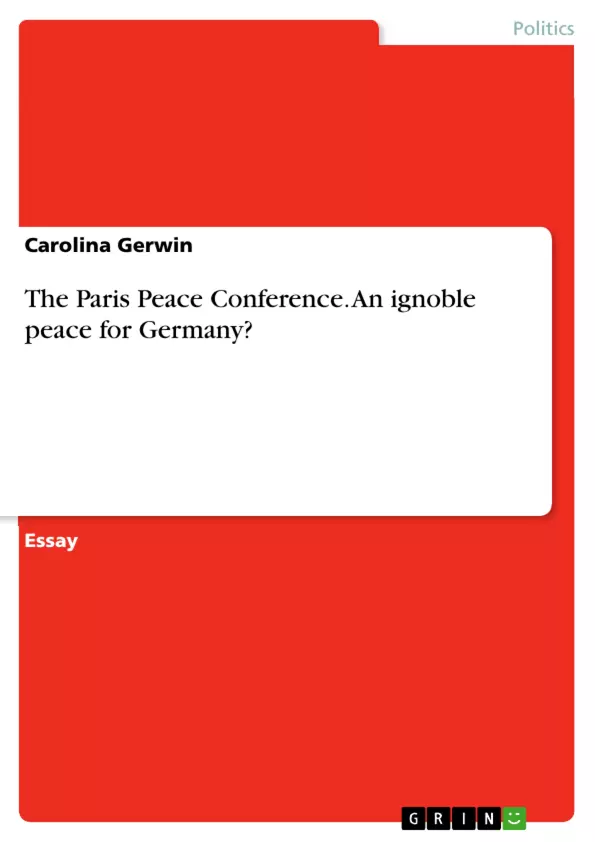This paper argues that one cannot state that the Treaty of Versailles was an "ignoble peace" as it had a compromise character in some respects. However, parts of the Treaty and the circumstances of the Paris Peace Conference led to the perception in the Weimar Republic that it was an ignoble peace and resulted in political and economic turmoil in the country.
Analyzing the articles of the Treaty, it had aspects of both, a victorious and a negotiated peace: Because Germany had no other choice than signing it and because of its isolation of not being part of the League of Nations and the high pressure due to the demilitarized zone, the Treaty had indeed aspects of a victorious peace. However, as Germany remained politically independent and was still able to trade with the Allies, the contract is not fully a victorious peace. Nevertheless, especially one article, number 231, played an important role in 1919 and afterwards, because it was continuously highlighted by the Germans and as the war-clause debate determined domestic and international politics for a long time.
Inhaltsverzeichnis (Table of Contents)
- To what extent can the outcome of the Paris Peace Conference be regarded as "an ignoble peace" for Germany?
- The Treaty of Versailles and its perception as an "ignoble peace"
- The circumstances of the Paris Peace Conference
- The Weimar Republic and the Treaty of Versailles
- Keynes' predictions about the consequences of the Treaty
- The Treaty of Versailles: An ignoble peace or a compromise?
- Conclusion
Zielsetzung und Themenschwerpunkte (Objectives and Key Themes)
This paper aims to investigate the extent to which the outcome of the Paris Peace Conference can be considered an "ignoble peace" for Germany. It examines the Treaty of Versailles, its negative perception in Germany, and its impact on the Weimar Republic. The paper also explores the predictions of John Maynard Keynes regarding the consequences of the Treaty.
- The Treaty of Versailles and its impact on Germany
- The perception of the Treaty as an "ignoble peace" in Germany
- The role of the Paris Peace Conference in shaping the Treaty
- The political and economic turmoil in the Weimar Republic
- The consequences of the Treaty and its influence on the rise of nationalism and extremism in Germany
Zusammenfassung der Kapitel (Chapter Summaries)
- This chapter introduces the research question and the main argument of the paper. It establishes that the Treaty of Versailles was seen as an "ignoble peace" in Germany, and it outlines the use of John Maynard Keynes's book "The Economic Consequences of the Peace" as a primary source.
- This chapter analyzes the articles of the Treaty of Versailles and its aspects of both victorious and negotiated peace. It focuses on the significance of Article 231, the "war guilt clause," and its impact on German perception and international politics.
- This chapter delves into the circumstances of the Paris Peace Conference, emphasizing the symbolism of Versailles, the humiliation of Germany, and the French desire for revenge. It highlights the role of power dynamics and the threat of chaos in shaping the Treaty.
- This chapter examines the early years of the Weimar Republic and the challenges it faced due to the Treaty. It discusses the "stab-in-the-back" myth, the burden of responsibility on the new government, and the political and economic turmoil of the period.
- This chapter analyzes Keynes's predictions about the economic consequences of the Treaty and its impact on Germany. It examines the social and political consequences of the Treaty, including the rise of nationalism and extremism.
Schlüsselwörter (Keywords)
The paper focuses on the Treaty of Versailles, its impact on Germany, the Paris Peace Conference, the Weimar Republic, the "ignoble peace" perception, John Maynard Keynes, the war guilt clause (Article 231), reparations, nationalism, extremism, and the economic consequences of the Treaty.
Frequently Asked Questions
Why was the Treaty of Versailles perceived as an "ignoble peace" in Germany?
The perception arose because Germany was excluded from negotiations, forced to accept sole responsibility for the war (Article 231), and faced heavy reparations and territorial losses.
What was Article 231 of the Treaty of Versailles?
Known as the "War Guilt Clause," it required Germany to accept legal and moral responsibility for starting World War I, serving as the legal basis for demanding reparations.
What were John Maynard Keynes' predictions about the Treaty?
In his book "The Economic Consequences of the Peace," Keynes predicted that the harsh economic terms would destroy Germany's economy and lead to future political instability and conflict in Europe.
Was the Treaty of Versailles a "victorious" or "negotiated" peace?
It had aspects of both. While Germany was forced to sign it under pressure (victorious peace), it remained a sovereign state and was able to maintain trade relations (negotiated elements).
How did the Treaty affect the Weimar Republic?
The Treaty burdened the new democratic government with economic hardship and political humiliation, fueling the "stab-in-the-back" myth and the rise of extremist movements.
- Citar trabajo
- Carolina Gerwin (Autor), 2017, The Paris Peace Conference. An ignoble peace for Germany?, Múnich, GRIN Verlag, https://www.grin.com/document/510901



